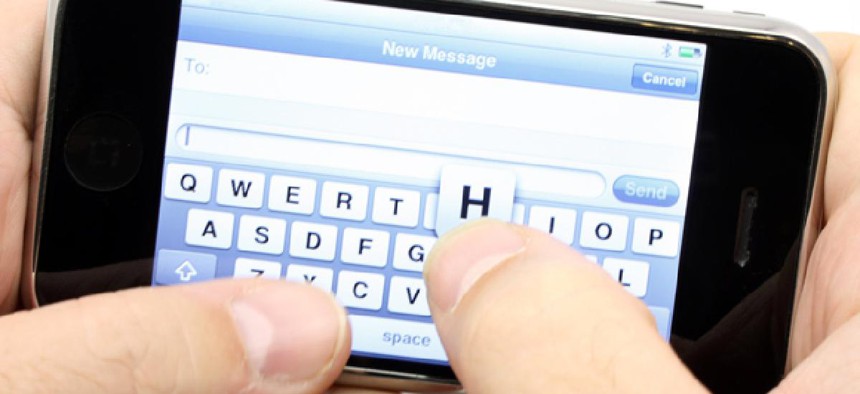What happens when staff use their own devices for work? They do their jobs.

Thinkstock
How BYOD works in one low-security office.
Cash-strapped agencies are increasingly looking to outsource the cost of smartphones, tablets and even teleworkers’ laptops to the employees themselves.
The basic theory behind bring-your-own-device policies is: why should agencies pay full price for something employees are already buying for themselves?
The greatest barriers to implementing BYOD plans across agencies have been security concerns on the government side and Big Brother concerns from employees who would rather not put the personal contents of their phone into the hands of security officers. With technology advancing and budgets shrinking, though, federal technology watchers say widespread BYOD use is on its way.
As a low security, highly mobile workforce that’s been relying on our personal devices for quite some time, the staff at GovExec and Nextgov thought we might be able to offer federal agencies some insights from the other side of BYOD.
We spent the second week of September tallying how much work we did on our personal devices vs. those provided by our company. Here’s what we found:
Mixing work and personal in one device makes it tougher to segregate work from personal elsewhere.
Nextgov Editor Katherine Peters receives between 300 and 400 emails each day and pores through roughly one-third of them on her smartphone and personal laptop before and after the workday is over.
“Thanks to the invention of the smartphone, it’s almost impossible to have strictly personal time during the work week,” she said.
Other staff members read emails on their phones while travelling to and from work, interviews or other appointments.
“I probably read almost ALL of my emails on that device, even if I’ve already read them on my work computer,” GovExec reporter Amanda Palleschi said.
Palleschi read over 100 emails on her phone during the week but only responded to eight of them on the device. That was another common theme.
“An iPhone keyboard isn't good for writing long tomes,” Senior Web Producer Ross Gianfortune said.
“I've found that technology can keep you tethered to work at times when you'd prefer to not be connected, like while on vacation or after hours,” Associate Art Director Chanin Knight said. “Maybe I just have bad impulse control when it comes to checking email.”
It’s important -- but difficult -- to set boundaries.
“Bad impulse control” was another common theme in staff members’ reactions to their personal device use.
Some staffers closed out of their work email accounts during the weekends only to find themselves checking back by Sunday afternoon. About one-third of us noted we appreciate technological gaps in our lives because they set boundaries we don’t or won’t on our own.
Web producer Caitlin Fairchild, for instance, hasn’t connected her work email to her phone yet. She plans to do that soon “so that I don't miss anything,” but also enjoys being able to “shut off my engagement after hours,” she said.
Peters wants to buy an iPad but said she’s worried it would make her even more tethered to work than her smartphone and laptop do.
“Given my long work hours, it’s almost beneficial that [my] Blackberry has near-zero data capabilities,” Nextgov Senior Reporter Aliya Sternstein said. “Walking, eating, driving and social engagements could be hazardous if Outlook was accessible 24 hours a day.”
Connectivity on personal devices can be a blessing, not just a curse.
There are plenty of positive aspects to this new hyper connectivity, too -- especially for a deadline-based and interdependent organization. People can discuss problems and make decisions remotely now without having to gather everyone together for an in-person meeting. We also can work from home more easily and run quick errands without fear something will fall apart while we’re gone or that we’ll slow the workflow.
Knight is an expectant mother who often has to duck out for doctor’s appointments during the day. When one appointment dragged on longer than she expected during our weeklong experiment she was able to stay in touch, reading a dozen emails during more than an hour of waiting time.
“My smartphone helps me stay on top of work at these times when I can't be in front of the computer,” she said.
If you own it, you’ll end up working on it.
Even though most of us have work laptops that we can cart anywhere, about half of us used personal computers for a half hour or more each day, often to check and respond to email first thing in the morning.
Editor Rebecca Carroll worked from home three out of five days during the week we tallied. During those days she edited stories entirely on her personal desktop.
“I don’t actually like loading my home computer with the network software and other work-related files, but I kind of prefer my own devices because they are good and I know them,” she said.
Editorial Fellow Kedar Pavgi only owns what he calls a “dumb phone” but still found himself taking notes on it one day when his laptop died.
About half of reporters said they use work and personal computers at the same time while teleworking -- one to watch a webcast Congressional hearing or other live event and the other to take notes, write stories and keep up with email.
As for this reporter, during a busy day working from home I might be doing an interview with my iPhone on speaker, recording it with my personal digital recorder, taking notes on a work laptop and streaming something else on my personal laptop. This massive setup looks pretty silly in my studio apartment.






